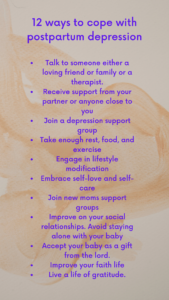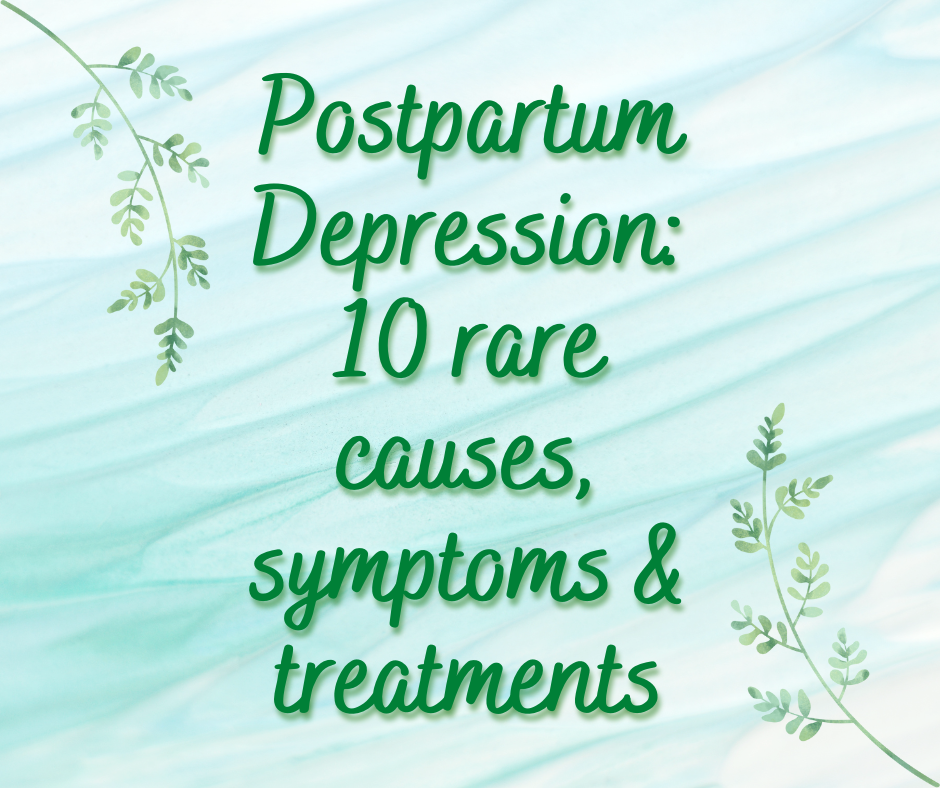Postpartum depression isn’t always a psychosis issue, as its most times a result of difficulties experienced during pregnancy and child delivery. Postpartum depression at its earlier stage can be resolved without medical treatment but with much love shown to the new mom.
Many new moms and especially first-time moms experience postpartum also known as “baby blues” which might start two to three days after delivery. However, when postpartum lasts for more than two weeks then it’s known as postpartum depression and this needs medical attention.
signs Common to postpartum include mood swings, anxiety, crying, unexplained fear, difficulty with sleep and poor eating habit, fear of breastfeeding, unexplained body aches, irritation, being overwhelmed, etc.
How do you know whether you are having baby blues or postpartum depression?
When postpartum symptoms last for so long, it can lead to postpartum depression. With postpartum depression, you might find it difficult to take care of your baby or show love to the baby. Some women who experience postpartum depression find it difficult to accept the fact that they gave birth to the baby especially if the pregnancy is unplanned or as a result of rape but not limited to these reasons.
Other reasons could be as a result of hormonal, changes, emotional, physical, social, or financial changes. However, among 1000 new mores, 75% will experience baby blues and 15% of new moms will experience postpartum depression after child delivery, and 1 out of the 1000 new moms will develop postpartum psychosis.
Here are the signs that you are having postpartum depression
- Severe mood swings causing depression
- Unexplainable excessive cry
- Difficulty in bonding with your newborn
- Intentional withdrawal from others
- Difficulty in sleeping or sleeping too much
- Disordered eating habit
- Excessive feelings of fatigue
- Excessive anger
- Excessive irritation
- Loss of interest in activities you once enjoyed
- Depressed mood or severe mood swings
- Excessive crying
- Difficulty bonding with your baby
- Withdrawing from family and friends
- Loss of appetite or eating much more than usual
- Inability to sleep (insomnia) or sleeping too much
- Overwhelming fatigue or loss of energy
- Feelings of hopelessness
- Anxiety
- Fear
- Frequent suicidal thoughts
- Lack of motivation
- Difficulty in focusing
How long does postpartum depression last?
Postpartum depression might last up to one year. However, you can get cured before then as most women get over this within three to six months with medical treatment, help from loving friends and families, and self-care.
Factors that can increase the risk of having postpartum depression after childbirth
There are several factors that can increase your risk of having postpartum depression after child delivery. Some of them are:
- If you are a single parent
- You’ve experienced rape
- If you have a medical history of depression, excessive anxiety, or worry
- If you live in a hostile environment
- If you are experiencing a conflict in your relationship or marriage
- If you experience pregnancy issues such as premature birth or a stillbirth
- If the baby cries a lot or has special needs.
Postpartum psychosis
Postpartum depression, when left untreated for months can lead to postpartum psychosis as the symptoms become more severe at this stage. This stage of postpartum is more dangerous and deadly for both mother and child and requires immediate treatment.
Symptoms of postpartum psychosis
- Severe confusion or disorientation
- Suicidal thoughts about yourself or your baby
- Hallucination and disillusionment
- Acute depression and anxiety
- Self-harming
When to see a doctor
You need to see the doctor for medical treatment when you experience these severe symptoms of postpartum depression:
- Suicidal thoughts toward yourself or your baby
- Hallucination
- Weight loss
- Sleep disorder
- Severe anxiety, worry, fear and depression.
Can postpartum depression affect the baby?
Yes, postpartum depression can have a severe effect on your baby if you are your baby is left untreated. You need to be physically, emotionally, and psychologically healthy to take good care of the baby. Without this, the baby might be malnourished resulting in growth disorder. You might also be unable to bond with your baby effectively and this could result in the baby having an impaired social ability.
How is postpartum depression diagnosed?
There are several ways in which the doctor can diagnose if you are having postpartum depression or baby blues. During your postpartum visit, the doctor may:
- Review your health history and ask questions on how you’ve felt since after delivery
- Perform physical tests or lab tests
- Perform a depression screening by asking you questions about yourself and your child. Doctors may use the Edinburgh postnatal depression scale of 1 to 10 which includes 10 questions relating to postpartum depression. Your responses about how you’ve felt in the last 7 days will be measured against the responses on the scale to know how close they are. Having a high measurement indicates that you are having postpartum depression.
- Could order a blood test to confirm hormonal changes
Treatment for postpartum depression
After the doctor’s diagnosis and you are confirmed to have postpartum depression, the doctor might place you on an antidepressant drug, conduct psychotherapy, and include you in a depression support group for participation. Postpartum psychosis can also be treated with anti-depressant or anti-psychosis drugs. Electroconvulsive therapy can also be an effective treatment. The doctor will place you on these treatments and therapies until you are responsive and becomes stable. You do not have to worry if you are a breastfeeding mom as your doctor will decide on the appropriate antidepressant drug or form of treatment to administer to you.
12 ways to cope with postpartum depression

If you’ve been diagnosed with postpartum depression and either or not commenced treatment, here are some effective ways to cope and even get healed.
- Talk to someone either a loving friend or family or a therapist.
- Receive support from your partner or anyone close to you
- Join a depression support group
- Take enough rest, food, and exercise
- Engage in lifestyle modification
- Embrace self-love and self-care
- Join new moms support groups
- Improve on your social relationships. Avoid staying alone with your baby
- Accept your baby as a gift from the lord.
- Improve your faith life
- Live a life of gratitude.
Conclusion
There is hope for recovery for every woman who is experiencing postpartum depression. With appropriate medical treatment and self-love, you can overcome your symptoms and be a happy mom.

Leave a Reply